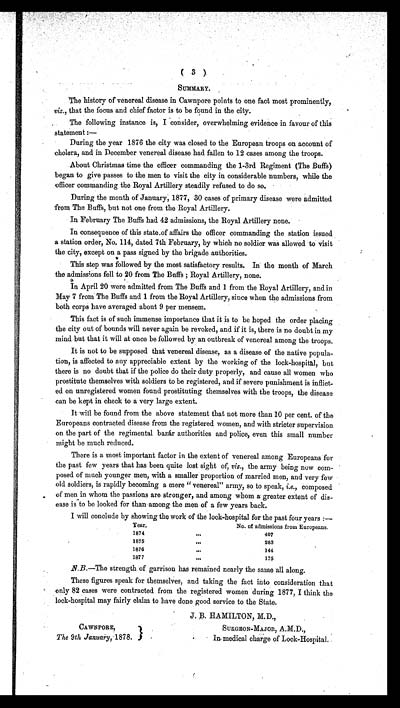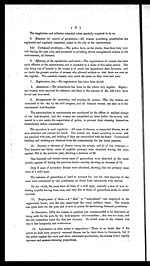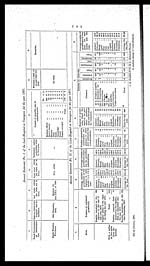Medicine - Institutions > Lock hospitals > Annual report on the working of the lock hospitals in the North-Western Provinces and Oudh > Fourth annual report on the working of the lock-hospitals in the North-Western Provinces and Oudh for the year 1877
(11) Page 3
Download files
Individual page:
Thumbnail gallery: Grid view | List view

( 3 )
SUMMARY.
The history of venereal disease in Cawnpore points to one fact most prominently,
viz., that the focus and chief factor is to be found in the city.
The following instance is, I consider, overwhelming evidence in favour of this
statement :—
During the year 1876 the city was closed to the European troops on account of
cholera, and in December venereal disease had fallen to 12 cases among the troops.
About Christmas time the officer commanding the 1-3rd Regiment (The Buffs)
began to give passes to the men to visit the city in considerable numbers, while the
officer commanding the Royal Artillery steadily refused to do so.
During the month of January; 1877, 30 cases of primary disease were admitted
from The Buffs, but not one from the Royal Artillery.
In February The Buffs had 42 admissions, the Royal Artillery none.
In consequence of this state of affairs the officer commanding the station issued
a station order, No. 114, dated 7th February, by which no soldier was allowed to visit
the city, except on a pass signed by the brigade authorities.
This step was followed by the most satisfactory results. In the month of March
the admissions fell to 20 from The Buffs ; Royal Artillery, none.
In April 20 were admitted from The Buffs and 1 from the Royal Artillery, and in
May 7 from The Buffs and 1 from the Royal Artillery, since when the admissions from
both corps have averaged about 9 per mensem.
This fact is of such immense importance that it is to be hoped the order placing
the city out of bounds will never again be revoked, and if it is, there is no doubt in my
mind but that it will at once be followed by an outbreak of venereal among the troops.
It is not to be supposed that venereal disease, as a disease of the native popula-
tion, is affected to any appreciable extent by the working of the lock-hospital, but
there is no doubt that if the police do their duty properly, and cause all women who
prostitute themselves with soldiers to be registered, and if severe punishment
is inflict-
ed on unregistered women found prostituting themselves with the troops, the disease
can be kept in check to a very large extent.
It will be found from the above statement that not more than 10 per cent. of the
Europeans contracted disease from the registered women, and with stricter supervision
on the part of the regimental bazár authorities and police, even this small number
might be much reduced.
There is a most important factor in the extent of venereal among Europeans for
the past few years that has been quite lost sight of, viz., the army being now com-
posed of much younger men, with a smaller proportion of married men, and very few
old soldiers, is rapidly becoming a mere " venereal" army, so to speak, i.e., composed
of men in whom the passions are stronger, and among whom a greater extent of dis-
ease is to be looked for than among the men of a few years back.
I will conclude by showing the work of the lock-hospital for the past four years :—
| Year. | No. of admissions from Europeans. | |
| 1874 | ... | 407 |
| 1875 | ... | 283 |
| 1876 | ... | 144 |
| 1877 | ... | 175 |
N.B.—The strength of garrison has remained nearly the same all along.
These figures speak for themselves, and taking the fact into consideration that
only 82 cases were contracted from the registered women during 1877, I think the
lock-hospital may fairly claim to have done good service to the State.
CAWNPORE,
The 9th January, 1878.
J. B. HAMILTON, M.D.,
SURGEON-MAJOR, A.M.D.,
In medical charge of Lock-Hospital.
Set display mode to: Large image | Zoom image | Transcription
Images and transcriptions on this page, including medium image downloads, may be used under the Creative Commons Attribution 4.0 International Licence unless otherwise stated. ![]()
| Permanent URL | https://digital.nls.uk/75110864 |
|---|




